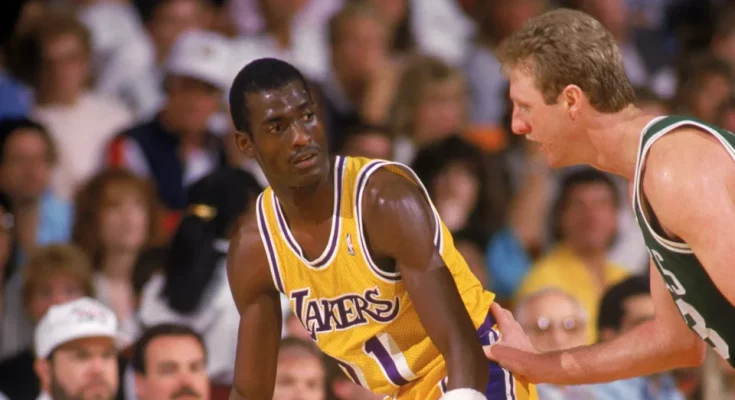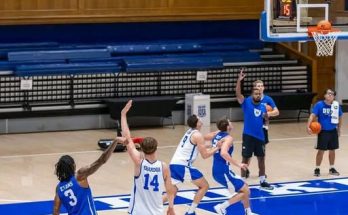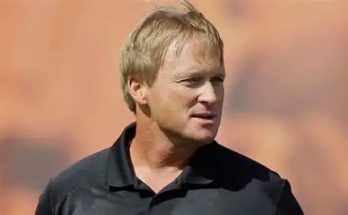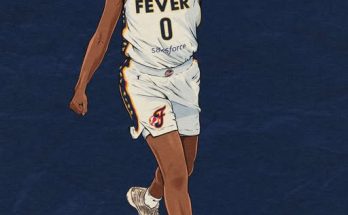Larry Bird wasn’t just hard to guard in his prime—he was virtually impossible. Standing at 6-foot-9, the Boston Celtics legend combined elite basketball IQ, flawless shooting mechanics, unmatched confidence, and a psychological edge that rattled defenders before he even touched the ball. His greatness didn’t stem from sheer athleticism, but from an uncanny ability to outthink, outshoot, and outplay anyone who dared line up across from him. In an NBA era filled with bruisers, super-athletes, and defensive specialists, Bird not only survived—he dominated.
For a player not known for blazing speed or jaw-dropping hops, Bird redefined what it meant to be a scoring machine. He could hit from anywhere on the floor, whether it was curling off a screen for a catch-and-shoot jumper, backing down a defender with a smooth post fadeaway, or simply walking into a three-pointer in transition. His range was deep, his release was quick, and his confidence was unshakeable. Guards were too small. Forwards were too slow. Centers? Forget it. They couldn’t handle his footwork, nor match his ability to anticipate the next move. Bird wasn’t just making shots—he was making statements.
What made Bird particularly infuriating to guard was that he would tell you exactly what he was going to do—and then do it. Countless stories from former NBA players paint the same picture: Bird would call his shot, predict the outcome, and then stare you down as it went in. One of the most famous instances came during the 1986 Three-Point Contest. He walked into the locker room and asked the other participants, “Which one of you guys is coming in second?” Then he went out and won it—still in his warm-up jacket. This wasn’t arrogance; it was supreme confidence backed by undeniable skill.
On the court, Bird was a tactician. He could read a defense like a chessboard and find the smallest sliver of space to exploit. He often saw plays develop two or three moves ahead, allowing him to make pinpoint passes and smart decisions even before defenders knew what hit them. When it came to creating his own shot, Bird had every tool in the box. Jab steps, pump fakes, spin moves, up-and-unders, turnarounds—he used them all with surgical precision. He didn’t waste motion. Every step had purpose. Every shot had intent.
Defenders had to prepare for more than just scoring. Bird was an elite passer who regularly averaged over 6 assists per game. He could draw double teams and kick the ball out with ease, finding open shooters or cutters. He thrived in the Celtics’ motion offense, which kept defenders on their heels and Bird in rhythm. If you overcommitted to stopping his shot, he’d pick you apart as a facilitator. If you gave him space, he’d bury you with jumpers. It was a pick-your-poison dilemma, and most defenses left the court poisoned.
There’s a physicality to Bird’s game that also can’t be overlooked. He played with grit, toughness, and a fearless attitude. He wasn’t afraid to throw his body on the line, dive for loose balls, or mix it up under the boards. Despite not being the fastest or strongest player, he had a way of imposing his will physically. Defenders who thought they could bully Bird quickly learned that he wouldn’t back down. If anything, he played better when provoked. His rivals—from Dennis Rodman to Magic Johnson—respected that tenacity, even when they were on the receiving end of it.
Speaking of Magic, no conversation about Bird’s dominance is complete without mentioning their rivalry. When Bird and Magic clashed in the NBA Finals during the 1980s, the entire basketball world tuned in. It wasn’t just Celtics vs. Lakers—it was chess vs. jazz, grit vs. flair, East vs. West. And while Magic brought his own brand of brilliance, Bird’s ability to impact the game in so many different ways often made him the most difficult matchup. Their duels were legendary, and it’s telling that even Magic admits Bird was one of the toughest players he ever faced.
Bird’s trash talk also added another layer to his unguardability. He didn’t just play mind games—he mastered them. His barbs weren’t random; they were calculated. Designed to get under your skin, throw you off your game, and remind you that no matter what you did, it wouldn’t be enough. Imagine being a defender, getting torched for a jumper, and then hearing Bird casually say, “I told you that was coming.” Or worse, “Next one’s going from the corner. Watch this.” And then he’d go do it. That’s the kind of psychological warfare that made even the best defenders second-guess themselves.
Let’s talk numbers, too. During his prime in the mid-1980s, Bird averaged around 26 points, 10 rebounds, and 7 assists per game. He won three consecutive MVP awards from 1984 to 1986—a feat only matched by a handful of all-time greats. His shooting percentages were absurd for his era: around 50% from the field, over 40% from three-point range, and above 90% from the free-throw line during his peak seasons. He didn’t just put up stats—he did it efficiently and consistently, all while being the focal point of defenses every night.
Defensive schemes didn’t matter much. Double-teams? He’d pass out of them. Zone coverage? He’d find the gaps. Full-court pressure? He’d bring the ball up himself and initiate the offense. Teams tried putting smaller, quicker players on him—Bird would take them to the post and shoot over them. Tried length and size? He’d stretch them out to the perimeter and rain jumpers in their face. The more teams focused on stopping Bird, the more he seemed to elevate his game.
Bird also had a knack for delivering in the clutch. If the game was on the line, you knew where the ball was going—and yet defenses still couldn’t stop him. He hit countless game-winners, buzzer-beaters, and clutch shots that left arenas in stunned silence or euphoric chaos. One of the most iconic came against the Washington Bullets in 1987 when he banked in a leaning three-pointer with no time left. The look on his face said it all: this was expected, inevitable. That’s what made him so dangerous—he played with an aura of inevitability.
Even his peers and the best defenders of his generation couldn’t help but acknowledge how impossible he was to guard. Hall of Famers like Michael Cooper, Dominique Wilkins, and Dennis Rodman all praised Bird’s skill and savvy. Rodman, known for his tenacious defense, once said Bird was the smartest player he ever faced. Cooper called him the toughest cover of his career. When the defenders of the era unanimously say guarding Bird was a nightmare, there’s no reason to doubt them.
What makes Bird’s dominance even more impressive is that he did it all while dealing with significant injuries. By the late 1980s, his back problems became chronic. And yet, he still played through pain, still delivered in big moments, still managed to be one of the best players on the floor. That resilience and determination only added to the mystique. It wasn’t just that Bird was better—it was that he was tougher, smarter, and more ruthless in execution.
Bird’s legacy isn’t just that he was hard to guard; it’s that he forced the entire NBA to evolve. He helped usher in the modern era of positionless basketball, where forwards are expected to shoot, pass, and handle the ball. He made three-point shooting a serious weapon long before the analytics era. He proved that elite athleticism wasn’t the only path to superstardom—that vision, intelligence, and a cold-blooded will to win could carry just as far, if not further.
So yes, Larry Bird in his prime wasn’t just hard to guard—he was the ultimate challenge. He made defenders feel helpless. He dismantled game plans. He walked onto the court with an attitude that said, “You can’t stop me,” and then he proved it—night after night, shot after shot, season after season. In a league filled with legends, Bird carved out a legacy built not just on skill, but on the relentless difficulty he presented to anyone trying to stop him. He was basketball’s great white shark—silent, calculating, and always deadly.



